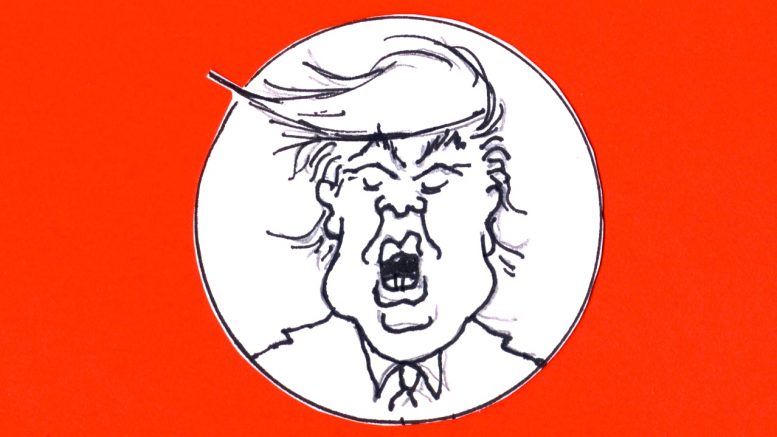
By Mary Pipher
The Toronto Star (2/1/18)
I don’t know about you, but one of the ways I’ve been coping with the Trumpian horror-show to the south is watching late-night American comedy. A regular dose of the acerbic and principled witticisms of Stephen Colbert, Trevor Noah, and Samantha Bee helps release some of the terrifying tension doled out daily by President Trump & Co.
It doesn’t matter how many times I hear different versions of the same jokes about pathetic crowd-size fixation, dangerous dictator-worship, or the entitled vapidity of Ivanka+Jared (Jarvanka?) — I laugh because I need relief from the fear, anger, and bigotry spewing regularly from the highest levels of power.
But there’s one recurring joke that adds to my tension instead of relieving it: linguistic mockery. You’re probably familiar with the type: “Trump misspelled concession; can he even read?!” “Trump misused an apostrophe — what an idiot.”
Donald Trump may actually be an idiot — I frankly can’t tell. He is undeniably a deluded narcissist, a dangerous racist, an unapologetic bully, and an abuser of women.
When smart shiny commentators ridicule Trump for not using their sophisticated language, for speaking and writing idiosyncratically and often ungrammatically, I bet that an awful lot of Trump supporters know, quite personally, what that ridicule feels like.
One thing he is not is a bad orator or an inept user of words. Trump knows how to use language to great effect; I would even say that he is a master of it — and my master’s degree is literally in “English Language.”
But the mockery doesn’t bother me because of its inaccuracy or pettiness. It bothers me because as a student of language history I recognize it, and it’s a type that does more harm than good.
Equating language errors with stupidity is so ingrained in most of us that we don’t stop to think about whether or not it has any validity. If someone uses your instead of you’re, the mistake — whether made through haste or genuine grammatical confusion — is often enough to dismiss the entire content of the message and the intelligence of the writer.
In online discussions, small errors in grammar or minor deviations from the standard language rarely fail to elicit at least one quasi-abusive ad hominem attack on the person who made the error, and even those of us who refrain from insulting people online may pass a silent judgment all the same. Whether or not the slip has obscured the writer’s meaning seems to be entirely beside the point.
There is a demonstrated lack of connection between minor linguistic errors and intelligence, and a corresponding wealth of research demonstrating the role of grammar policing in suppressing non-standard dialects and maintaining class-based social hierarchies. As sociolinguist Deborah Cameron wrote in Verbal Hygiene, “linguistic bigotry is among the last publicly expressible prejudices left to the western intelligentsia.”
So when Trump says, “I don’t talk to him … that’s just a misnomer,” or tweets about the “Mainstream Meadia,” don’t imply that the misspelling of media makes him stupid, or that the incorrect use of misnomer means that he doesn’t know how to use words. He does know how to use words — dangerously well.
Instead, let’s look carefully at how he uses words successfully. Let’s focus on critiquing, challenging, and mocking him for what he’s using words to say and to do. Is it petty or venal or vain or ignorant? Then let’s mock that directly, without the vaguely sanctimonious shelter of minor grammatical critiques.
What we say & what they hear
Because — and this is the crux of the matter — when the average Trump enthusiast hears “can Donald Trump even read?! Ha! What an idiot” — what they hear is you’re stupid. You don’t know how to read. You didn’t go to a fancy school like I did.
The self-identification of poor uneducated whites with Donald Trump — a born millionaire with an Ivy League education — is often baffling to liberals, even those who account for the leading role of racism.
Well, when smart shiny commentators ridicule Trump for not using their sophisticated language, for speaking and writing idiosyncratically and often ungrammatically, I bet that an awful lot of Trump supporters know, quite personally, what that ridicule feels like.
It is a linguistic sneering with not-so-subtle class overtones, and one which has likely kept many an average Trump voter out of fancy rooms and high salaries. In Donald Trump, some of the verbally ostracized have a powerful, unapologetic champion — finally their very own linguistic bully pulpit.
Unfortunately for us all, he is an entirely false champion. Perhaps the rest of us could try being real ones — or, at least, stop deepening the linguistic divide.

